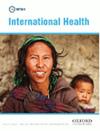An examination of the predictors of change in BMI among 38 026 school students in Makkah, Saudi Arabia
IF 2.3
4区 医学
Q2 PUBLIC, ENVIRONMENTAL & OCCUPATIONAL HEALTH
引用次数: 0
Abstract
Background The prevalence of childhood obesity has substantially increased in the Gulf Cooperation Council countries, including Saudi Arabia. The Rashaka initiative is a Saudi national school-based multicomponent intervention that was introduced in the school year 2016–2017 to address childhood overweight and obesity. This study aims to examine the effect of the Rashaka initiative on students’ body mass index (BMI) for two academic years (2016–2017 and 2018–2019) and to analyse predictors of BMI change. Methods Secondary data for this pre–post study was provided by the Ministry of Health for 38 026 students from 89 intermediate and secondary schools that implemented the initiative in Makkah City, Saudi Arabia. It was analysed using non-parametric tests and multiple regressions at a 5% level of significance. Results Over 2 y of implementation, BMI was reduced significantly across the schools (p < 0.001). Based on the regression modelling, school gender and education stage were found to be the only significant predictors of BMI change. Girls and intermediate schools had greater BMI reductions than boys and secondary schools (p < 0.001 and p = 0.031). Conclusions This study provides tentative evidence for the effectiveness of the Rashaka intervention in Makkah City. In addition, our study has identified that the Rashaka initiative may require modification to improve its effect on boys and students in secondary schools.对沙特阿拉伯麦加市 38 026 名在校学生体重指数变化预测因素的研究
背景海湾合作委员会国家(包括沙特阿拉伯)的儿童肥胖症发病率大幅上升。Rashaka 倡议是沙特阿拉伯于 2016-2017 学年推出的一项全国性校本多成分干预措施,旨在解决儿童超重和肥胖问题。本研究旨在考察 Rashaka 计划对两个学年(2016-2017 学年和 2018-2019 学年)学生体重指数(BMI)的影响,并分析 BMI 变化的预测因素。方法 本次前后期研究的二手数据由卫生部提供,涉及沙特阿拉伯麦加市实施该倡议的 89 所中小学的 38 026 名学生。数据采用非参数检验和多元回归法进行分析,显著性水平为 5%。结果 在两年的实施过程中,各学校的体重指数都有显著下降(p &;lt;0.001)。根据回归模型,学校性别和教育阶段是预测体重指数变化的唯一重要因素。与男生和中学相比,女生和中职学校的 BMI 下降幅度更大(p &;lt; 0.001 和 p = 0.031)。结论 本研究为麦加市拉沙卡干预措施的有效性提供了初步证据。此外,我们的研究还发现,"拉沙卡 "倡议可能需要进行修改,以提高其对男生和中学生的效果。
本文章由计算机程序翻译,如有差异,请以英文原文为准。
求助全文
约1分钟内获得全文
求助全文
来源期刊

International Health
PUBLIC, ENVIRONMENTAL & OCCUPATIONAL HEALTH-
CiteScore
4.50
自引率
0.00%
发文量
83
审稿时长
>12 weeks
期刊介绍:
International Health is an official journal of the Royal Society of Tropical Medicine and Hygiene. It publishes original, peer-reviewed articles and reviews on all aspects of global health including the social and economic aspects of communicable and non-communicable diseases, health systems research, policy and implementation, and the evaluation of disease control programmes and healthcare delivery solutions.
It aims to stimulate scientific and policy debate and provide a forum for analysis and opinion sharing for individuals and organisations engaged in all areas of global health.
 求助内容:
求助内容: 应助结果提醒方式:
应助结果提醒方式:


